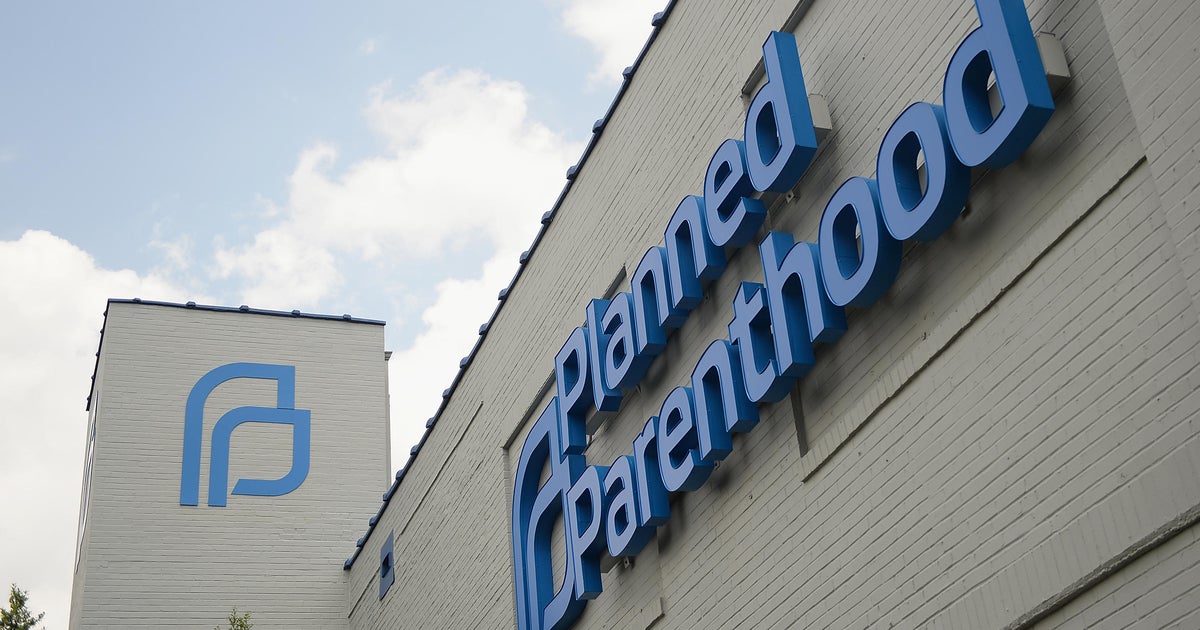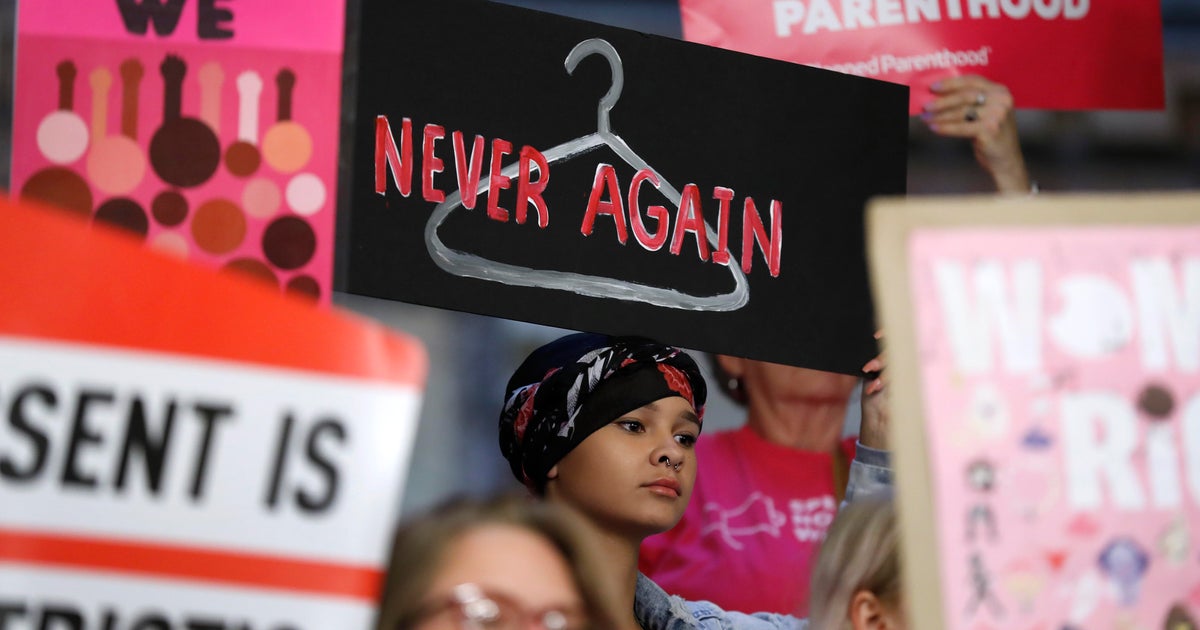CBS News
Reproductive rights expert says “women are going to pay the price” in abortion, IVF battles across United States

NEW YORK — As abortion access and reproductive rights hang in the balance for many women in this country, we take a look at the personal impact of these hard-earned rights and the possibility some face of losing them.
Annie Trombatore Peltzer snuggles her eldest child Rhodes and her newborn daughter Lila, who was born 6 months ago with the help of invitro fertilization, or IVF.
“Life-changing for sure. And life-changing for her. She wouldn’t be here,” Peltzer said.
In 2016, at 26 years old, Peltzer knew she wanted children, but not right then — so she underwent the grueling process of hormone injections and egg retrieval to freeze embryos with the man who would become her husband.
“Fast forward to getting pregnant with Rhodes, and it happened naturally. We didn’t need to use it. Then just this last year, when trying to conceive with her, we tried for about a year, no success, so we were really happy that we had made those choices,” Peltzer said.
But Peltzer’s story is one that has only been possible for around 40 years, and one that might no longer be possible for women in places like Alabama, where IVF is in limbo after that state’s Supreme Court ruled embryos are human beings.
From abortion restrictions to bans on IVF, reproductive rights for women in the United States have never been more uncertain.
“This idea of choice — who even has a choice, right? People who want to parent might not have really the choice to be able to parent,” said Dr. Wendy Schor-Haim, with Barnard College.
Schor-Haim and Dr. Cecelia Lie-Spahn, also with Barnard, are experts in the history of reproductive rights in the U.S. and say this country has a long history of controlling women by controlling their bodies.
“One of the biggest, most important acts of resistance for enslaved women was being able to keep the children that they had because they were so often sold to other slave holders. So I think about this kind of broader historical context in Alabama and how once again, we have this situation where people are told who can have a family, who cannot,” Lie-Spahn said.
Schor-Haim says the tipping point in the way abortion was perceived came with the formation of the American Medical Association, initially run solely by men.
“What’s interesting is that first came the male control, and then came the stigmatization of abortion. So it’s not like there was a national American, you know, popular tide turning against abortion at the time that abortion began to be really restricted. The restrictions caused the stigmatization,” she said.
After years of tireless protests and lobbying, in 1973, the Supreme Court issued its landmark decision in Roe v. Wade, protecting a woman’s right to choose to have an abortion.
According to the Bureau of Labor Statistics, in 1970, the workforce was comprised of 43% women. By 2019, that number had jumped to 57.4%. Scholars say one of the biggest factors credited for that spike in female employment was a woman’s right to control her fertility.
In 2022, the court overturned Roe, giving states the right to choose. In the year since, 21 states have banned or restricted abortions.
“It’s like a runaway train, and people think that they’re controlling it … Women are going to pay the price. Women are like the football in the football game, and it’s really scary to think about,” Schor-Haim said.
“I think we want this world in which people can thrive, and if you don’t have the ability to make choices, can you really [thrive]? Not at all. I think beyond that, then there’s like the real visceral horror of people who, it’s their only way to get pregnant and have that dream taken away from them. That’s a really scary feeling,” Peltzer said.
Providers in Alabama have resumed some IVF services after the state’s Republican governor signed a bill into law earlier this month protecting patients and providers from legal liability.
CBS News
Labor secretary on June jobs report, Biden’s health

Watch CBS News
Be the first to know
Get browser notifications for breaking news, live events, and exclusive reporting.
CBS News
Kansas’ top court rejects 2 anti-abortion laws, bolstering state right to abortion access

Kansas’ highest court on Friday struck down state laws regulating abortion providers more strictly than other health care professionals and banning a common second-trimester procedure, reaffirming its stance that the state constitution protects abortion access.
The Kansas Supreme Court’s 5-1 rulings in two separate cases signal that the state’s Republican-controlled Legislature faces stricter limits on regulating abortion than GOP lawmakers thought and suggests other restrictions could fall. Lawsuits in lower state courts already are challenging restrictions on medication abortions, a ban on doctors using teleconferences to meet with patients, rules for what doctors must tell patients before an abortion and a requirement that patients wait 24 hours after receiving information about a procedure to terminate their pregnancies.
“We stand by our conclusion that section 1 of the Kansas Constitution Bill of Rights protects a fundamental right to personal autonomy, which includes a pregnant person’s right to terminate a pregnancy,” Justice Eric Rosen wrote for the majority in overturning the ban on dilation and evacuation, also known as D&E.
The panel found that the state had failed to meet “its evidentiary burden to show the Challenged Laws further its interests in protection of maternal health and regulation of the medical profession as it relates to maternal health,” Justice Melissa Standridge wrote in the majority opinion on the clinic regulations.
Justice K.J. Wall did not participate in either ruling on Friday, while Justice Caleb Stegall was the lone dissenter.
Stegall, who was appointed by conservative Republican Gov. Sam Brownback, is widely regarded as the court’s most conservative member.
Kansas’ top court declared in a 2019 decision that abortion access is a matter of bodily autonomy and a “fundamental” right under the state constitution. Voters in August 2022 also decisively rejected a proposed amendment that would have explicitly declared abortion not a fundamental right and allowed state lawmakers to greatly restrict or ban it.
Lawyers for the state had urged the justices to walk back their 2019 ruling and uphold the two laws, which haven’t been enforced because of the legal battles over them. The state’s solicitor general, appointed by Republican Attorney General Kris Kobach, had argued the 2022 vote didn’t matter in determining whether the laws could stand.
The court disagreed and handed abortion-rights supporters a big legal victory.
Kansas has become an outlier among states with Republican-controlled Legislatures since the U.S. Supreme Court issued its Dobbs decision in June 2022, allowing states to ban abortion completely. That’s led to an influx of patients from states with more restrictive laws, particularly Oklahoma and Texas. The Guttmacher Institute, which supports abortion rights, projected last month that about 20,000 abortions were performed in Kansas in 2023 or 152% more than in 2020.
Kansas doesn’t ban most abortions until the 22nd week of pregnancy, but it requires minors obtain the written consent of their parents or a guardian. Other requirements, including the 24-hour waiting period and what a provider must tell patients, have been put on hold. A lower court is considering a challenge to them by providers.
Abortion opponents argued ahead of the August 2022 vote that failing to change the state constitution would doom long-standing restrictions enacted under past GOP governors. Kansas saw a flurry of new restrictions under former Republican Gov. Sam Brownback from 2011 through 2018.
The health and safety rules aimed specifically at abortion providers were enacted in 2011. Supporters said they would protect women’s health – though there was no evidence provided then documenting that such rules in other states led to better health outcomes. Providers said the real goal was to force them out of business.
The other law was the first of its kind in the nation when enacted in 2015 and deals with a certain type of dilation and evacuation, or D&E, procedure performed during the second trimester.
According to state health department statistics, about 600 D&E procedures were done in Kansas in 2022, accounting for 5% of the state’s total abortions. About 88% of the state’s abortions occurred in the first trimester. The state has yet to release statistics for 2023.
The D&E procedure ban would have forced providers to use alternative methods that the Center for Reproductive Rights, an abortion-rights advocacy group, has said are riskier for the patient and more expensive.
The 2019 ruling came in the early stages of the lawsuit over the 2015 ban. The justices kept the law on hold but sent the case back to the trial court to examine the ban further. A trial judge said the law could not stand.
Three of the court’s seven justices joined the court since the 2019 decision. All three were appointed by Democratic Gov. Laura Kelly, a strong abortion-rights supporter, but one of the three, Justice K.J. Wall, removed himself from the cases.
CBS News
Sick of swiping? Here’s why single people are breaking up with dating apps.

Frustrated singles are breaking up with dating apps.
Last year Americans downloaded dating apps more than 36 million times, which is down 16% from 2020.
“The way people are using dating apps today and the speed of communication. It’s swipe, swipe, swipe, onto the date. Getting ghosted, getting frustrated, being burned out. Wash, rinse and repeat,” said dating coach Damona Hoffman, who is also the author of “F the Fairytale.”
Hoffman said an increasing number of her clients are feeling what she calls “dating app burnout,” which is stress and fatigue caused by endless swiping.
She said she sees too much “zombie dating.” It’s a term she came up with to describe the behavior she sees on dating apps. She defines it as mindless scrolling, searching for validation and not meaningful connection, and talking to too many people.
“A lot of these DMs and texts, they don’t go anywhere. So that’s really leading to the dating burnout because we get our hopes up. Our adrenaline goes up and then it’s like withdrawal when the person doesn’t materialize into a date.”
Hoffman met her husband online and knows firsthand how frustrating it can be, but said the goal is for connection and users need to apply more empathy.
“We’re feeling this sense of, I call it the communication crisis that we’re in, and you feel it even if you’re not dating. You feel this ‘everybody’s talking but we’re not saying anything.'”
She suggests “dating hygiene,” which is being strategic with your time, eliminating go-nowhere connections and taking stock of your profile on dating apps by tracking reactions and responses.
“Which of the dates and conversations are actually turning into something real, so that you’re not putting all of this energy into connections that don’t make you feel good first of all, or materialize into a relationship.”
Hoffman, who also hosts a podcast called “Dates and Mates,” advises speaking to the individual on the app for just one week before meeting in person.
“The whole goal of dating apps is to meet in person so what happens when you stay in the texting trap and you stay on the app too long, you develop a false sense of intimacy.”
Hoffman said she wants to help people feel more in control of their dating destiny and as a professional who has helped people find love for almost 20 years both online and offline, she disagrees with the saying “you will find love when you least expect it.”
“When people approach dating mindfully, strategically, they get results,” she said. “They get to the relationship.”
If you’re sick of swiping, she suggests attending events, try speed dating, hire a matchmaker or engage in your community to make connections.
The CEO of Match Group, the company that owns Tinder, OkCupid, Hinge and Match.com, said late last year that they are “optimistic about the future” and that he expects to see the decline in paid users “moderating.”








